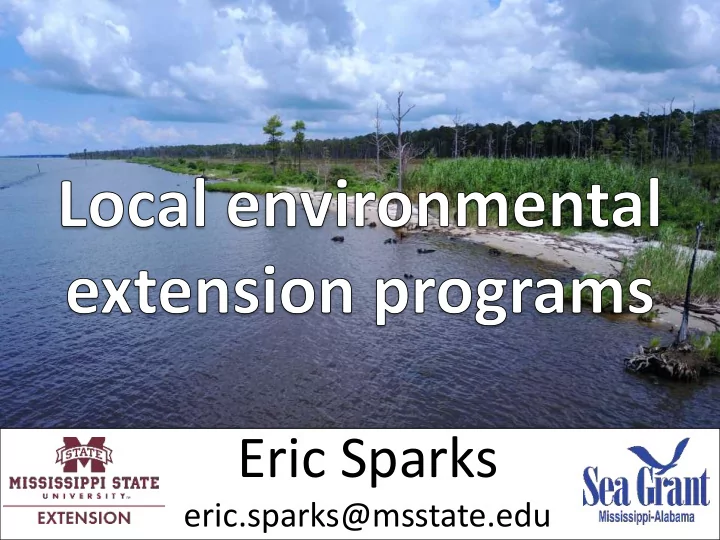

Eric Sparks eric.sparks@msstate.edu
AL.com
AL.com NOAA Gulf Spill Restoration
Ecological Consulting Services, Inc. Eric Sparks
Bulkhead installed Shoreline begins to recede Vertical erosion Loss of occurs intertidal habitat
Douglass and Pickel 1999
Living Shoreline Hardened Structure Photos: Rachel Gittman
Newsday.com
AL.com
Erosion
AL.com
• Never heard of them • Permitting • No demonstration projects • Perceived cost • Don’t think living shorelines can protect their property from erosion • Don’t connect natural environments with coastal benefits (subconsciously they do) • Like clean cut look and/or don’t like wildlife AL.com
Email me: eric.sparks@msstate.edu
Living Shoreline Success • Poor candidate • Good candidate
Top 4 factors affecting Design and Costs
Levels of wave energy LOW MODERATE HIGH Wave energy reducers
Materials (per linear foot) Living Elements Hybrid Elements Bulkhead Wood Plants $115-265 $10 Rip rap $18-35 Vinyl Coir log $125-285 $16-20 Reef balls $40 Concrete Oyster shell $500-1000 $5-20
Bottom Lin ine cost estimates (m (materials + labor) Living Bulkhead shorelines Price range (per linear ft) $200-1300 $400-1300 Lifetime indefinite 20-50 yrs
The Wise Project On Palmetto Creek Perdido Beach, AL 225 linear ft. shoreline
Materials cost Wood stake Coir log Temporary wave mitigation: $2,240 600 6” sods local grown marsh grass: $1,800
No labor costs!
Tools for the job Help! Shovels Sledge hammer Post hole diggers
Instructable: 1. Assess site & design 2. Prep site 3. Plant sods
Finished product Before After
Project costs Living Wooden Shoreline Bulkhead (estimated cost) (estimated cost) $30k - $49k $30k - $56k (self installation) (self installation) $26,000 $4,200
Perdido Key, FL • Failed bulkhead • 150 ft of shoreline • $3,000 • Stop mowing!!!!! • Install temporary wave break • Plant marsh
• Never heard of them • Permitting • No demonstration projects • Perceived cost • Don’t think living shorelines can protect their property from erosion • Don’t connect natural environments with coastal benefits (subconsciously they do) • Like clean cut look and/or don’t like wildlife AL.com
Questions?
• Education, , awareness, and research program • Cleanups (J (July 5 and October 21) • To register or get more info, , visit mscoastalcleanup.org
AL.com
AL.com
Caitlin Wessel
What are microplastics?
Where do they come from? Primary microplastics Secondary microplastics Archie Crofton Wolfram Burner/Flickr
Most common microplastic • Fibers • Synthetic fabrics - polyester, nylon, acrylic • Shed from clothes with each washing Florida Microplastic Awareness Project • BIG source of microplastics Florida Microplastic Awareness Project Caitlin Wessel
Part of ICC • Over 50 local sites • ≈4,000 volunteers • 10-14 tons of trash
How to get involved: › Register at www.mscoastalcleanup.org › Assemble a group of friends or family › Mark your calendar!
Coastal Cleanup Agenda: • Morning clean up • Collect data • Free lunch • Educational booths • Prizes
We provide sampling gear, guides, and training. Partners provide citizen scientists and data.
• How to sample in the field • How to build necessary equipment • Processing water samples • Processing beach samples
Margaret Waterson Margaret Waterson Margaret Waterson
• Location of sample • Number of microplastics per volume/area • Type of microplastics • Fibers • Fragments d) • Film • Beads
Want to participate? Contact me at eric.sparks@msstate.edu
MASTERNATURALIST.EXTENSION.MSSTATE.EDU
Chapters ➢ Central - Jackson ➢ Coastal - Biloxi
Mission To develop an organization of knowledgeable volunteers to help promote conservation and management of Mississippi’s natural resources through education, outreach, and service within their communities.
Who are Master Naturalists? ➢ Adults interested in nature ➢ Adults who want to educate and volunteer to their community
Program reach ➢ Tracking began in 2008 ➢ Approximately 230 participants ➢ Participants have reached over 200,000 people! ➢ Growing exponentially
1. Basic training course Certification 2. *8 advanced training hours Requirements 3. *40 hours volunteer hours *Annual requirements that must be approved
Coastal Course Agenda ➢ 1 – Intro, pre-test, Ecology ➢ September 7 th ➢ Coastal Research and Extension Center (CREC) ➢ 2 – Forest Ecology ➢ September 15 th ➢ De Soto National Forest ➢ 3 – Coastal and Estuarine Ecology ➢ September 23 rd ➢ Dauphin Island Sea Lab ➢ 4 – Entomology, Human Impacts ➢ September 28 th ➢ CREC
Coastal Course Agenda ➢ 5 – Fish ➢ October 3 rd ➢ Gulf Coast Research Lab ➢ 6 – Wildlife and Forest Management ➢ October 7 th ➢ Longleaf pine plantation ➢ 7 – Coastal habitats, birds ➢ October 14 th ➢ Grand Bay NERR ➢ 8 – Volunteering, post-test, project presentations ➢ October 17 th ➢ CREC
Last year’s coastal course
How to find out about Master Naturalist opportunities ➢ Website ➢ http://masternaturalist.extension.msstate.edu/ ➢ Check and “like” facebook page ➢ www.facebook.com/MSMasterNaturalists ➢ Email ➢ eric.sparks@msstate.edu
Want to be added to waiting list? Contact me at eric.sparks@msstate.edu
Recommend
More recommend